Spring 19 Professional Skills Portfolio (PRSK4048) Assignment
VerifiedAdded on 2020/10/05
|20
|5377
|114
Portfolio
AI Summary
This document is a professional skills portfolio for the PRSK4048 module, focusing on teamwork, professional ethics, and project management. The portfolio includes a Belbin questionnaire analysis to identify team roles, followed by a written discussion on applying Belbin theory in team member selection, fostering creativity and individualism, and reflecting on individual team roles. The portfolio also addresses professional ethics, including a code of conduct and an in-class writing task. Furthermore, it covers project management, incorporating a Gantt chart and evidence of a presentation. The assignment requires individual completion of all tasks except for the collaborative elements. The student has provided a written discussion on teamwork, including coordinator, specialist, and monitor evaluator roles, highlighting the importance of creativity and individualism for team motivation and productivity. The assignment emphasizes the application of theoretical concepts to practical scenarios and requires a total word count of 2,100 words (+/- 10%).
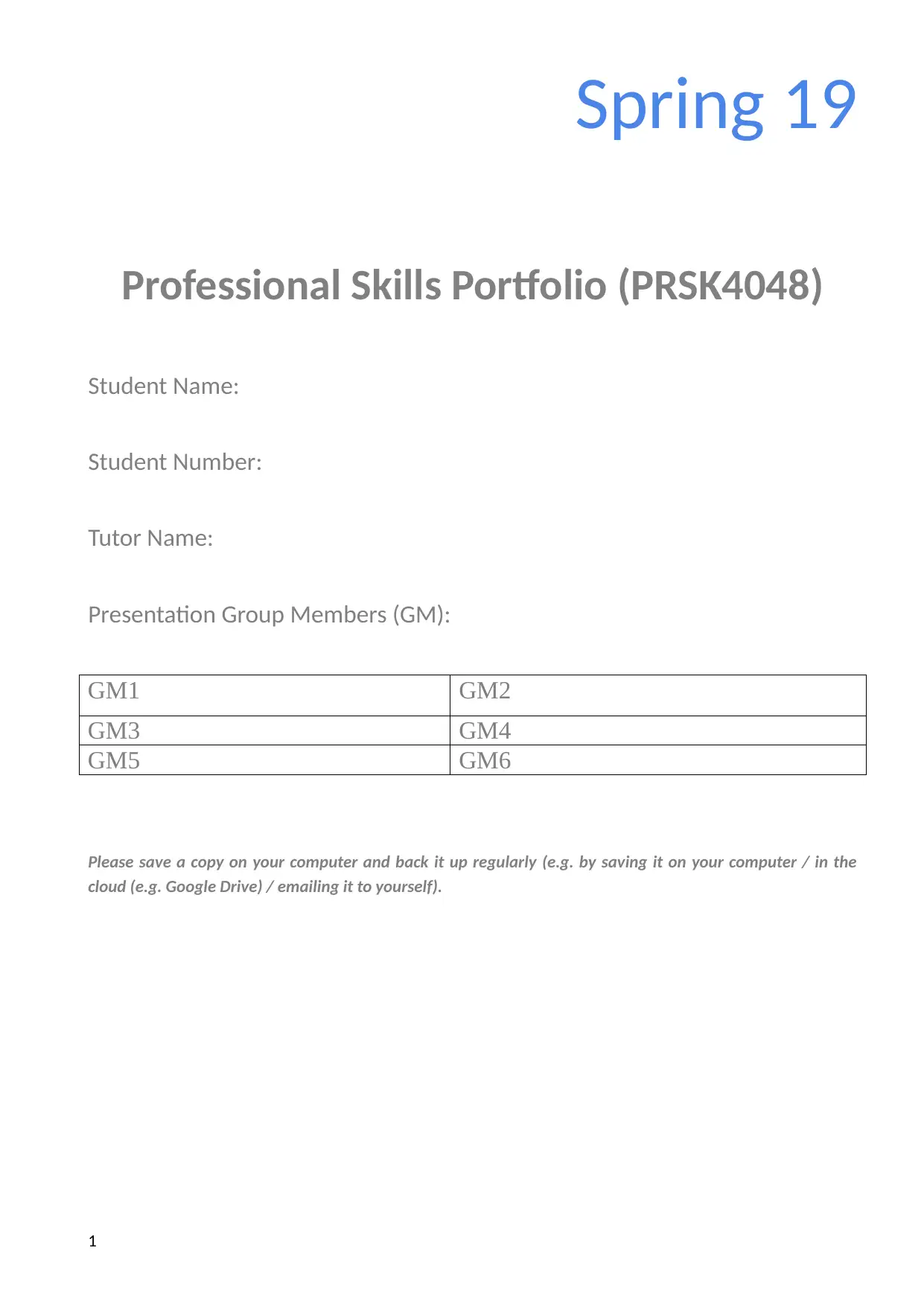
Spring 19
Professional Skills Portfolio (PRSK4048)
Student Name:
Student Number:
Tutor Name:
Presentation Group Members (GM):
GM1 GM2
GM3 GM4
GM5 GM6
Please save a copy on your computer and back it up regularly (e.g. by saving it on your computer / in the
cloud (e.g. Google Drive) / emailing it to yourself).
1
Professional Skills Portfolio (PRSK4048)
Student Name:
Student Number:
Tutor Name:
Presentation Group Members (GM):
GM1 GM2
GM3 GM4
GM5 GM6
Please save a copy on your computer and back it up regularly (e.g. by saving it on your computer / in the
cloud (e.g. Google Drive) / emailing it to yourself).
1
Paraphrase This Document
Need a fresh take? Get an instant paraphrase of this document with our AI Paraphraser

2
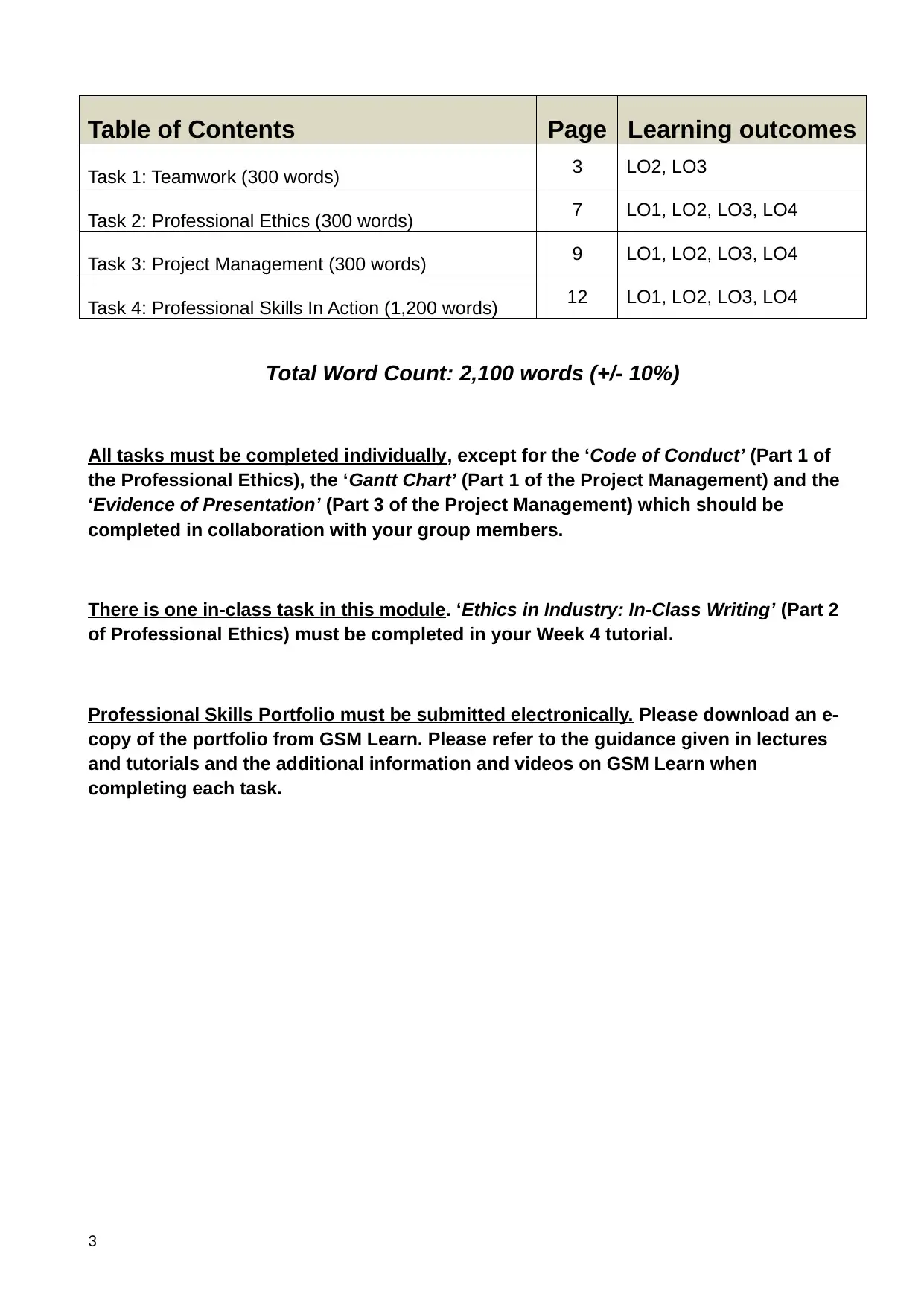
Table of Contents Page Learning outcomes
Task 1: Teamwork (300 words) 3 LO2, LO3
Task 2: Professional Ethics (300 words) 7 LO1, LO2, LO3, LO4
Task 3: Project Management (300 words) 9 LO1, LO2, LO3, LO4
Task 4: Professional Skills In Action (1,200 words) 12 LO1, LO2, LO3, LO4
Total Word Count: 2,100 words (+/- 10%)
All tasks must be completed individually, except for the ‘Code of Conduct’ (Part 1 of
the Professional Ethics), the ‘Gantt Chart’ (Part 1 of the Project Management) and the
‘Evidence of Presentation’ (Part 3 of the Project Management) which should be
completed in collaboration with your group members.
There is one in-class task in this module. ‘Ethics in Industry: In-Class Writing’ (Part 2
of Professional Ethics) must be completed in your Week 4 tutorial.
Professional Skills Portfolio must be submitted electronically. Please download an e-
copy of the portfolio from GSM Learn. Please refer to the guidance given in lectures
and tutorials and the additional information and videos on GSM Learn when
completing each task.
3
Task 1: Teamwork (300 words) 3 LO2, LO3
Task 2: Professional Ethics (300 words) 7 LO1, LO2, LO3, LO4
Task 3: Project Management (300 words) 9 LO1, LO2, LO3, LO4
Task 4: Professional Skills In Action (1,200 words) 12 LO1, LO2, LO3, LO4
Total Word Count: 2,100 words (+/- 10%)
All tasks must be completed individually, except for the ‘Code of Conduct’ (Part 1 of
the Professional Ethics), the ‘Gantt Chart’ (Part 1 of the Project Management) and the
‘Evidence of Presentation’ (Part 3 of the Project Management) which should be
completed in collaboration with your group members.
There is one in-class task in this module. ‘Ethics in Industry: In-Class Writing’ (Part 2
of Professional Ethics) must be completed in your Week 4 tutorial.
Professional Skills Portfolio must be submitted electronically. Please download an e-
copy of the portfolio from GSM Learn. Please refer to the guidance given in lectures
and tutorials and the additional information and videos on GSM Learn when
completing each task.
3
⊘ This is a preview!⊘
Do you want full access?
Subscribe today to unlock all pages.

Trusted by 1+ million students worldwide
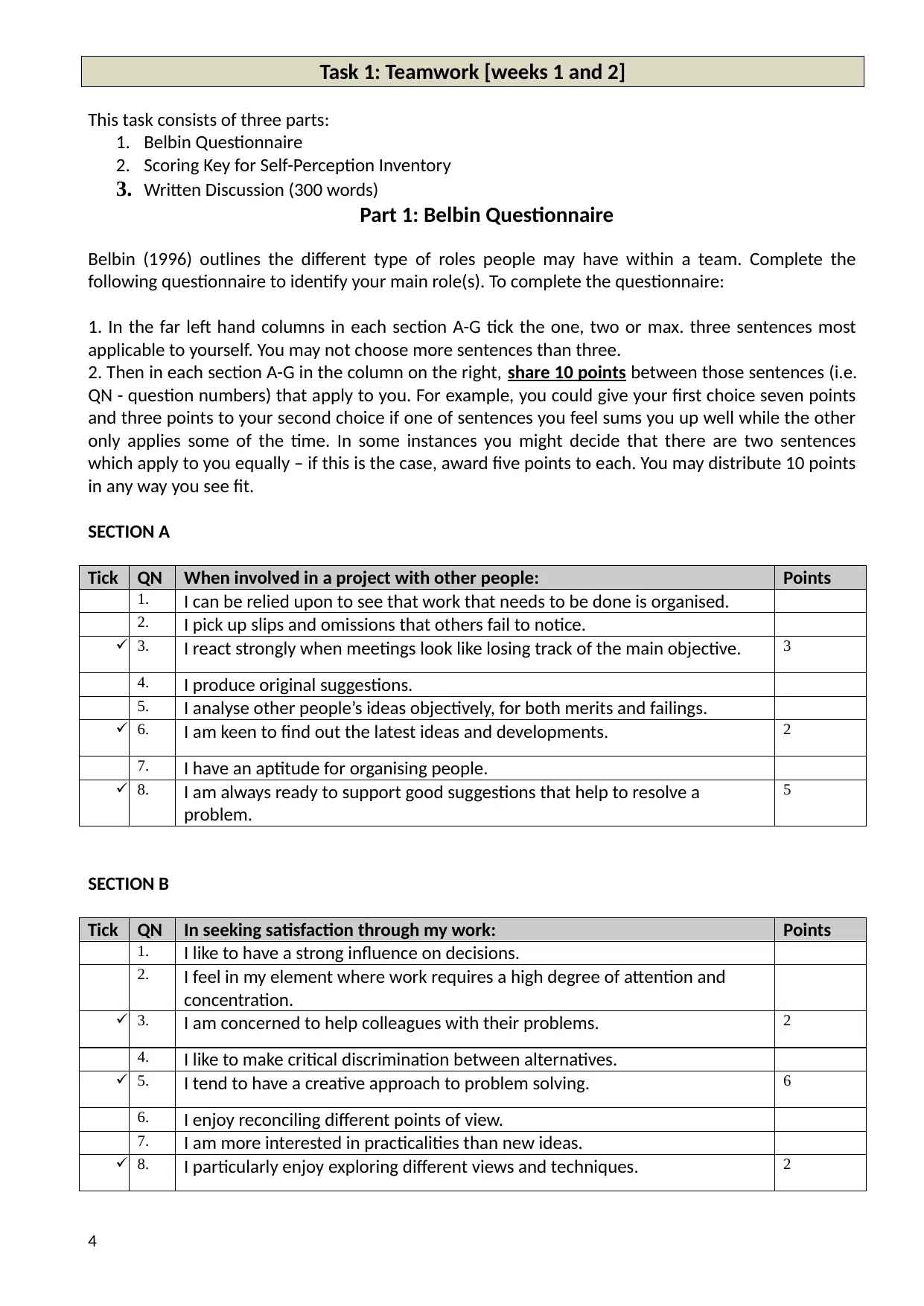
Task 1: Teamwork [weeks 1 and 2]
This task consists of three parts:
1. Belbin Questionnaire
2. Scoring Key for Self-Perception Inventory
3. Written Discussion (300 words)
Part 1: Belbin Questionnaire
Belbin (1996) outlines the different type of roles people may have within a team. Complete the
following questionnaire to identify your main role(s). To complete the questionnaire:
1. In the far left hand columns in each section A-G tick the one, two or max. three sentences most
applicable to yourself. You may not choose more sentences than three.
2. Then in each section A-G in the column on the right, share 10 points between those sentences (i.e.
QN - question numbers) that apply to you. For example, you could give your first choice seven points
and three points to your second choice if one of sentences you feel sums you up well while the other
only applies some of the time. In some instances you might decide that there are two sentences
which apply to you equally – if this is the case, award five points to each. You may distribute 10 points
in any way you see fit.
SECTION A
Tick QN When involved in a project with other people: Points
1. I can be relied upon to see that work that needs to be done is organised.
2. I pick up slips and omissions that others fail to notice.
3. I react strongly when meetings look like losing track of the main objective. 3
4. I produce original suggestions.
5. I analyse other people’s ideas objectively, for both merits and failings.
6. I am keen to find out the latest ideas and developments. 2
7. I have an aptitude for organising people.
8. I am always ready to support good suggestions that help to resolve a
problem.
5
SECTION B
Tick QN In seeking satisfaction through my work: Points
1. I like to have a strong influence on decisions.
2. I feel in my element where work requires a high degree of attention and
concentration.
3. I am concerned to help colleagues with their problems. 2
4. I like to make critical discrimination between alternatives.
5. I tend to have a creative approach to problem solving. 6
6. I enjoy reconciling different points of view.
7. I am more interested in practicalities than new ideas.
8. I particularly enjoy exploring different views and techniques. 2
4
This task consists of three parts:
1. Belbin Questionnaire
2. Scoring Key for Self-Perception Inventory
3. Written Discussion (300 words)
Part 1: Belbin Questionnaire
Belbin (1996) outlines the different type of roles people may have within a team. Complete the
following questionnaire to identify your main role(s). To complete the questionnaire:
1. In the far left hand columns in each section A-G tick the one, two or max. three sentences most
applicable to yourself. You may not choose more sentences than three.
2. Then in each section A-G in the column on the right, share 10 points between those sentences (i.e.
QN - question numbers) that apply to you. For example, you could give your first choice seven points
and three points to your second choice if one of sentences you feel sums you up well while the other
only applies some of the time. In some instances you might decide that there are two sentences
which apply to you equally – if this is the case, award five points to each. You may distribute 10 points
in any way you see fit.
SECTION A
Tick QN When involved in a project with other people: Points
1. I can be relied upon to see that work that needs to be done is organised.
2. I pick up slips and omissions that others fail to notice.
3. I react strongly when meetings look like losing track of the main objective. 3
4. I produce original suggestions.
5. I analyse other people’s ideas objectively, for both merits and failings.
6. I am keen to find out the latest ideas and developments. 2
7. I have an aptitude for organising people.
8. I am always ready to support good suggestions that help to resolve a
problem.
5
SECTION B
Tick QN In seeking satisfaction through my work: Points
1. I like to have a strong influence on decisions.
2. I feel in my element where work requires a high degree of attention and
concentration.
3. I am concerned to help colleagues with their problems. 2
4. I like to make critical discrimination between alternatives.
5. I tend to have a creative approach to problem solving. 6
6. I enjoy reconciling different points of view.
7. I am more interested in practicalities than new ideas.
8. I particularly enjoy exploring different views and techniques. 2
4
Paraphrase This Document
Need a fresh take? Get an instant paraphrase of this document with our AI Paraphraser
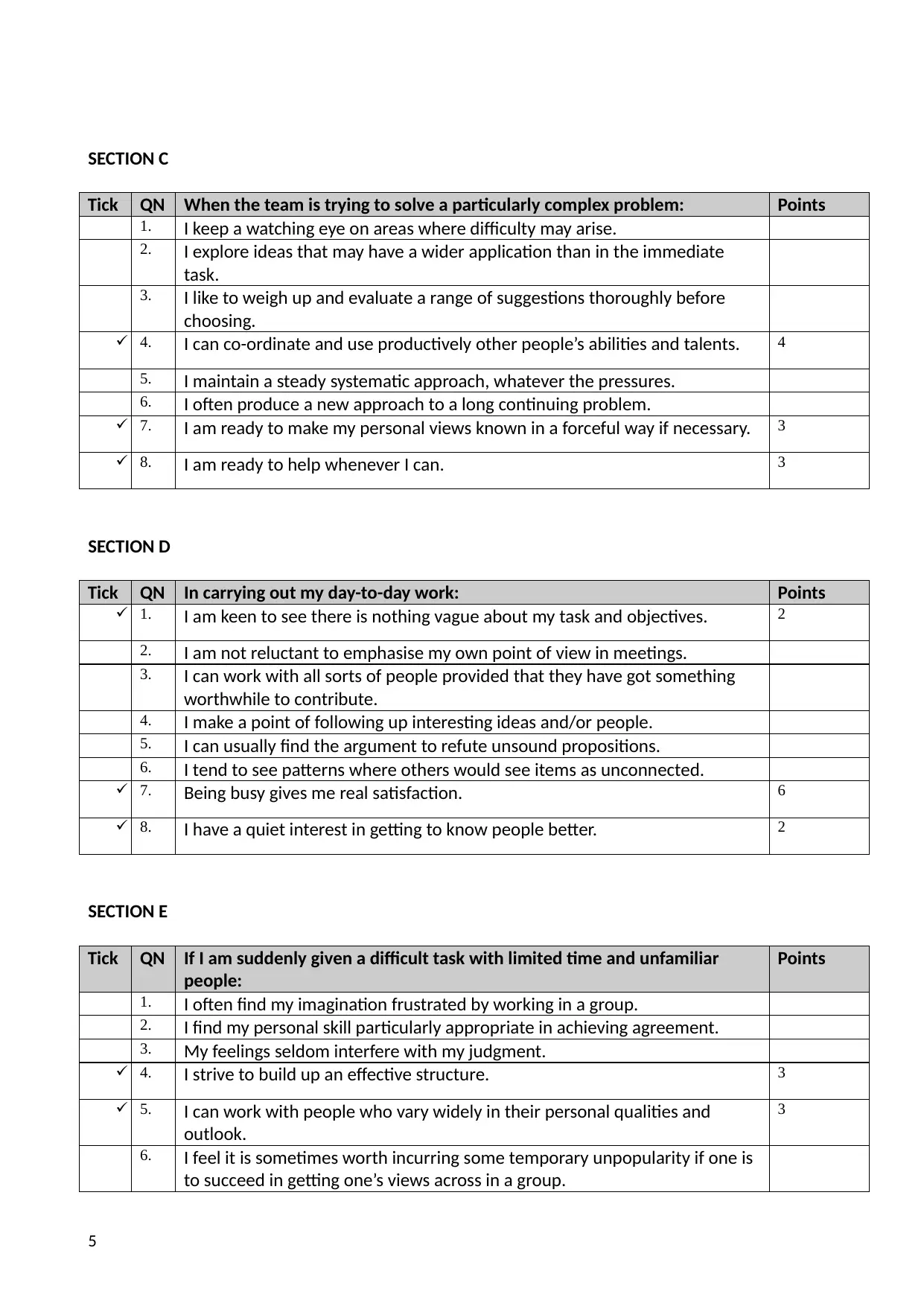
SECTION C
Tick QN When the team is trying to solve a particularly complex problem: Points
1. I keep a watching eye on areas where difficulty may arise.
2. I explore ideas that may have a wider application than in the immediate
task.
3. I like to weigh up and evaluate a range of suggestions thoroughly before
choosing.
4. I can co-ordinate and use productively other people’s abilities and talents. 4
5. I maintain a steady systematic approach, whatever the pressures.
6. I often produce a new approach to a long continuing problem.
7. I am ready to make my personal views known in a forceful way if necessary. 3
8. I am ready to help whenever I can. 3
SECTION D
Tick QN In carrying out my day-to-day work: Points
1. I am keen to see there is nothing vague about my task and objectives. 2
2. I am not reluctant to emphasise my own point of view in meetings.
3. I can work with all sorts of people provided that they have got something
worthwhile to contribute.
4. I make a point of following up interesting ideas and/or people.
5. I can usually find the argument to refute unsound propositions.
6. I tend to see patterns where others would see items as unconnected.
7. Being busy gives me real satisfaction. 6
8. I have a quiet interest in getting to know people better. 2
SECTION E
Tick QN If I am suddenly given a difficult task with limited time and unfamiliar
people:
Points
1. I often find my imagination frustrated by working in a group.
2. I find my personal skill particularly appropriate in achieving agreement.
3. My feelings seldom interfere with my judgment.
4. I strive to build up an effective structure. 3
5. I can work with people who vary widely in their personal qualities and
outlook.
3
6. I feel it is sometimes worth incurring some temporary unpopularity if one is
to succeed in getting one’s views across in a group.
5
Tick QN When the team is trying to solve a particularly complex problem: Points
1. I keep a watching eye on areas where difficulty may arise.
2. I explore ideas that may have a wider application than in the immediate
task.
3. I like to weigh up and evaluate a range of suggestions thoroughly before
choosing.
4. I can co-ordinate and use productively other people’s abilities and talents. 4
5. I maintain a steady systematic approach, whatever the pressures.
6. I often produce a new approach to a long continuing problem.
7. I am ready to make my personal views known in a forceful way if necessary. 3
8. I am ready to help whenever I can. 3
SECTION D
Tick QN In carrying out my day-to-day work: Points
1. I am keen to see there is nothing vague about my task and objectives. 2
2. I am not reluctant to emphasise my own point of view in meetings.
3. I can work with all sorts of people provided that they have got something
worthwhile to contribute.
4. I make a point of following up interesting ideas and/or people.
5. I can usually find the argument to refute unsound propositions.
6. I tend to see patterns where others would see items as unconnected.
7. Being busy gives me real satisfaction. 6
8. I have a quiet interest in getting to know people better. 2
SECTION E
Tick QN If I am suddenly given a difficult task with limited time and unfamiliar
people:
Points
1. I often find my imagination frustrated by working in a group.
2. I find my personal skill particularly appropriate in achieving agreement.
3. My feelings seldom interfere with my judgment.
4. I strive to build up an effective structure. 3
5. I can work with people who vary widely in their personal qualities and
outlook.
3
6. I feel it is sometimes worth incurring some temporary unpopularity if one is
to succeed in getting one’s views across in a group.
5
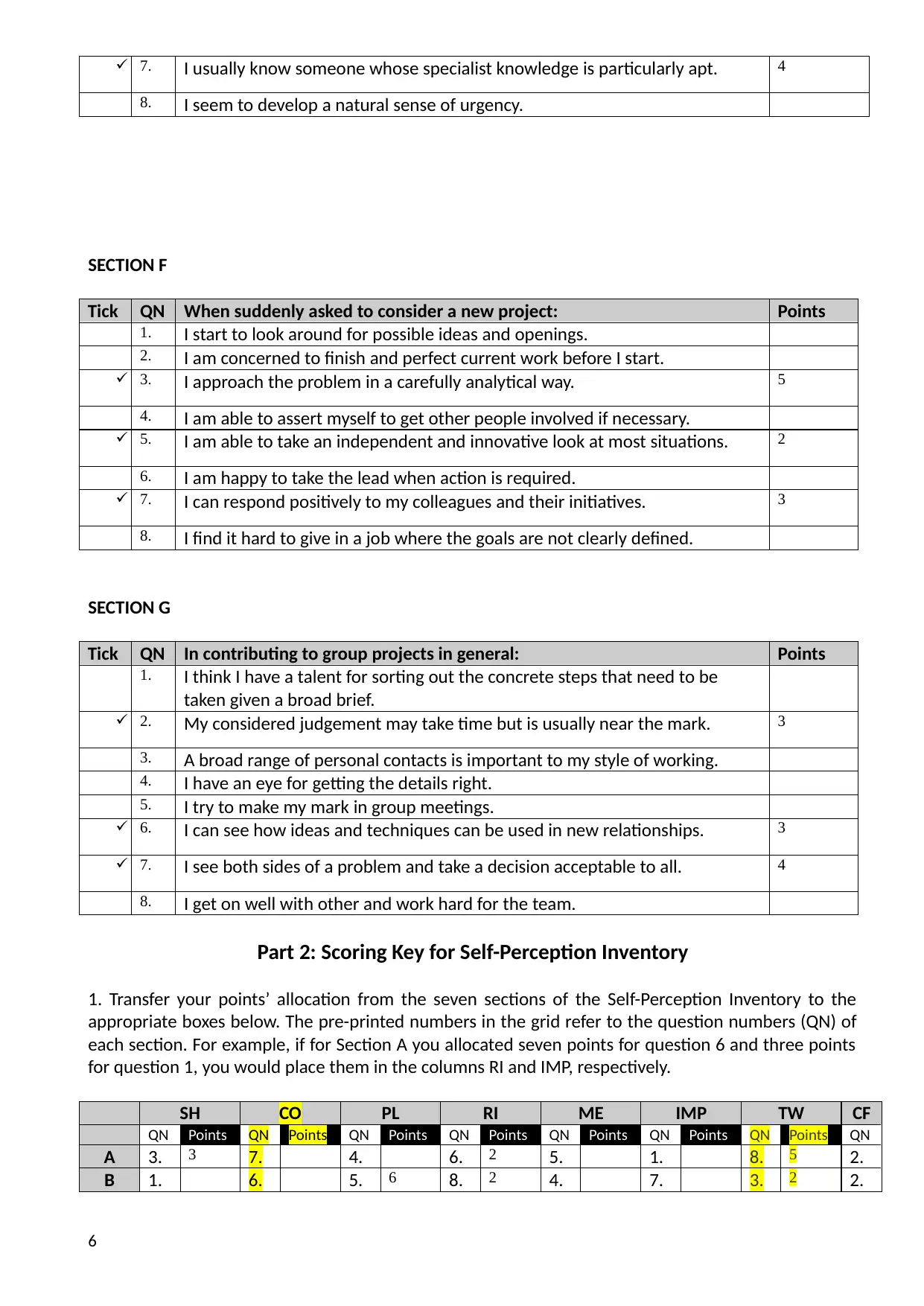
7. I usually know someone whose specialist knowledge is particularly apt. 4
8. I seem to develop a natural sense of urgency.
SECTION F
Tick QN When suddenly asked to consider a new project: Points
1. I start to look around for possible ideas and openings.
2. I am concerned to finish and perfect current work before I start.
3. I approach the problem in a carefully analytical way. 5
4. I am able to assert myself to get other people involved if necessary.
5. I am able to take an independent and innovative look at most situations. 2
6. I am happy to take the lead when action is required.
7. I can respond positively to my colleagues and their initiatives. 3
8. I find it hard to give in a job where the goals are not clearly defined.
SECTION G
Tick QN In contributing to group projects in general: Points
1. I think I have a talent for sorting out the concrete steps that need to be
taken given a broad brief.
2. My considered judgement may take time but is usually near the mark. 3
3. A broad range of personal contacts is important to my style of working.
4. I have an eye for getting the details right.
5. I try to make my mark in group meetings.
6. I can see how ideas and techniques can be used in new relationships. 3
7. I see both sides of a problem and take a decision acceptable to all. 4
8. I get on well with other and work hard for the team.
Part 2: Scoring Key for Self-Perception Inventory
1. Transfer your points’ allocation from the seven sections of the Self-Perception Inventory to the
appropriate boxes below. The pre-printed numbers in the grid refer to the question numbers (QN) of
each section. For example, if for Section A you allocated seven points for question 6 and three points
for question 1, you would place them in the columns RI and IMP, respectively.
SH CO PL RI ME IMP TW CF
QN Points QN Points QN Points QN Points QN Points QN Points QN Points QN
A 3. 3 7. 4. 6. 2 5. 1. 8. 5 2.
B 1. 6. 5. 6 8. 2 4. 7. 3. 2 2.
6
8. I seem to develop a natural sense of urgency.
SECTION F
Tick QN When suddenly asked to consider a new project: Points
1. I start to look around for possible ideas and openings.
2. I am concerned to finish and perfect current work before I start.
3. I approach the problem in a carefully analytical way. 5
4. I am able to assert myself to get other people involved if necessary.
5. I am able to take an independent and innovative look at most situations. 2
6. I am happy to take the lead when action is required.
7. I can respond positively to my colleagues and their initiatives. 3
8. I find it hard to give in a job where the goals are not clearly defined.
SECTION G
Tick QN In contributing to group projects in general: Points
1. I think I have a talent for sorting out the concrete steps that need to be
taken given a broad brief.
2. My considered judgement may take time but is usually near the mark. 3
3. A broad range of personal contacts is important to my style of working.
4. I have an eye for getting the details right.
5. I try to make my mark in group meetings.
6. I can see how ideas and techniques can be used in new relationships. 3
7. I see both sides of a problem and take a decision acceptable to all. 4
8. I get on well with other and work hard for the team.
Part 2: Scoring Key for Self-Perception Inventory
1. Transfer your points’ allocation from the seven sections of the Self-Perception Inventory to the
appropriate boxes below. The pre-printed numbers in the grid refer to the question numbers (QN) of
each section. For example, if for Section A you allocated seven points for question 6 and three points
for question 1, you would place them in the columns RI and IMP, respectively.
SH CO PL RI ME IMP TW CF
QN Points QN Points QN Points QN Points QN Points QN Points QN Points QN
A 3. 3 7. 4. 6. 2 5. 1. 8. 5 2.
B 1. 6. 5. 6 8. 2 4. 7. 3. 2 2.
6
⊘ This is a preview!⊘
Do you want full access?
Subscribe today to unlock all pages.

Trusted by 1+ million students worldwide
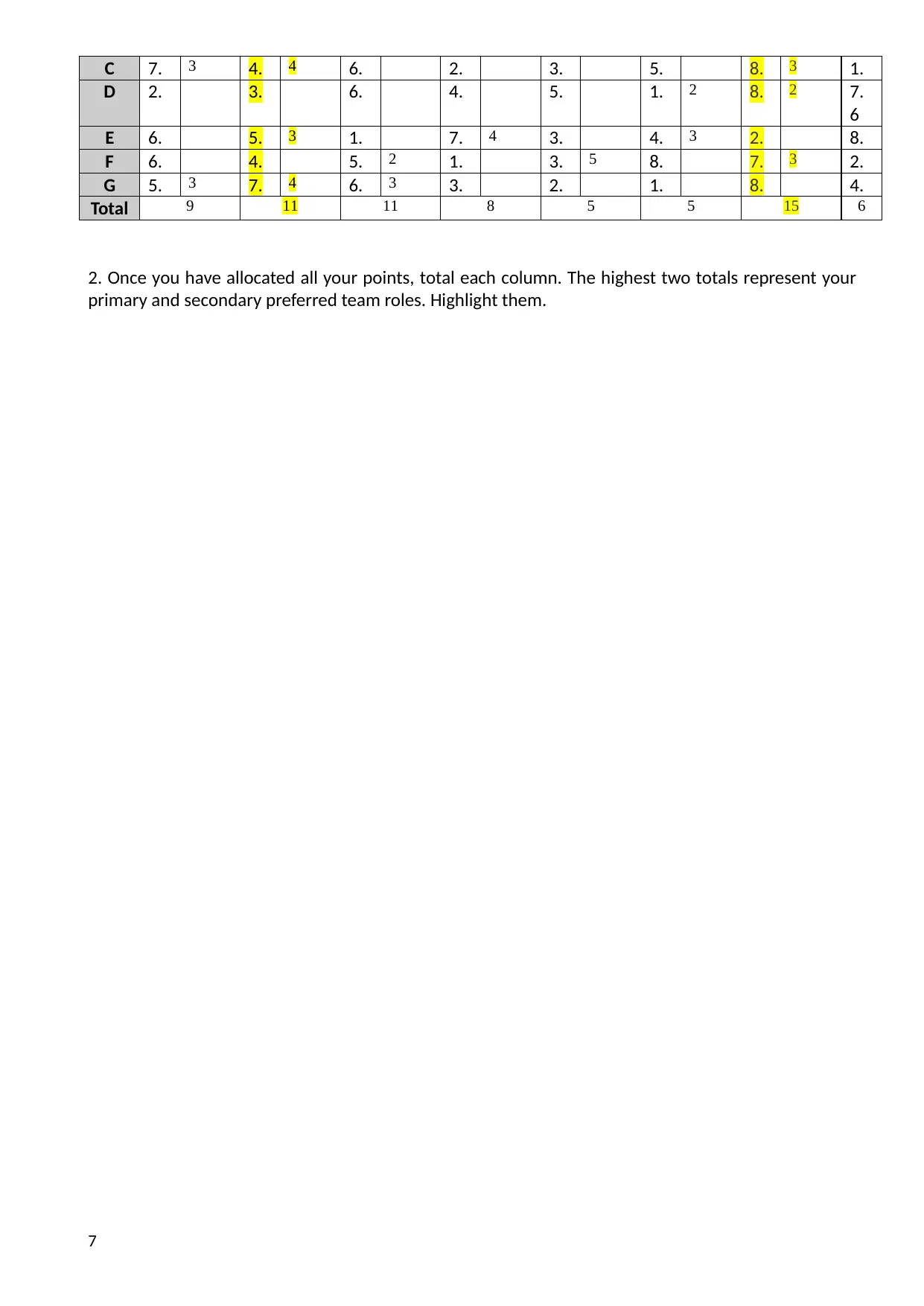
C 7. 3 4. 4 6. 2. 3. 5. 8. 3 1.
D 2. 3. 6. 4. 5. 1. 2 8. 2 7.
6
E 6. 5. 3 1. 7. 4 3. 4. 3 2. 8.
F 6. 4. 5. 2 1. 3. 5 8. 7. 3 2.
G 5. 3 7. 4 6. 3 3. 2. 1. 8. 4.
Total 9 11 11 8 5 5 15 6
2. Once you have allocated all your points, total each column. The highest two totals represent your
primary and secondary preferred team roles. Highlight them.
7
D 2. 3. 6. 4. 5. 1. 2 8. 2 7.
6
E 6. 5. 3 1. 7. 4 3. 4. 3 2. 8.
F 6. 4. 5. 2 1. 3. 5 8. 7. 3 2.
G 5. 3 7. 4 6. 3 3. 2. 1. 8. 4.
Total 9 11 11 8 5 5 15 6
2. Once you have allocated all your points, total each column. The highest two totals represent your
primary and secondary preferred team roles. Highlight them.
7
Paraphrase This Document
Need a fresh take? Get an instant paraphrase of this document with our AI Paraphraser
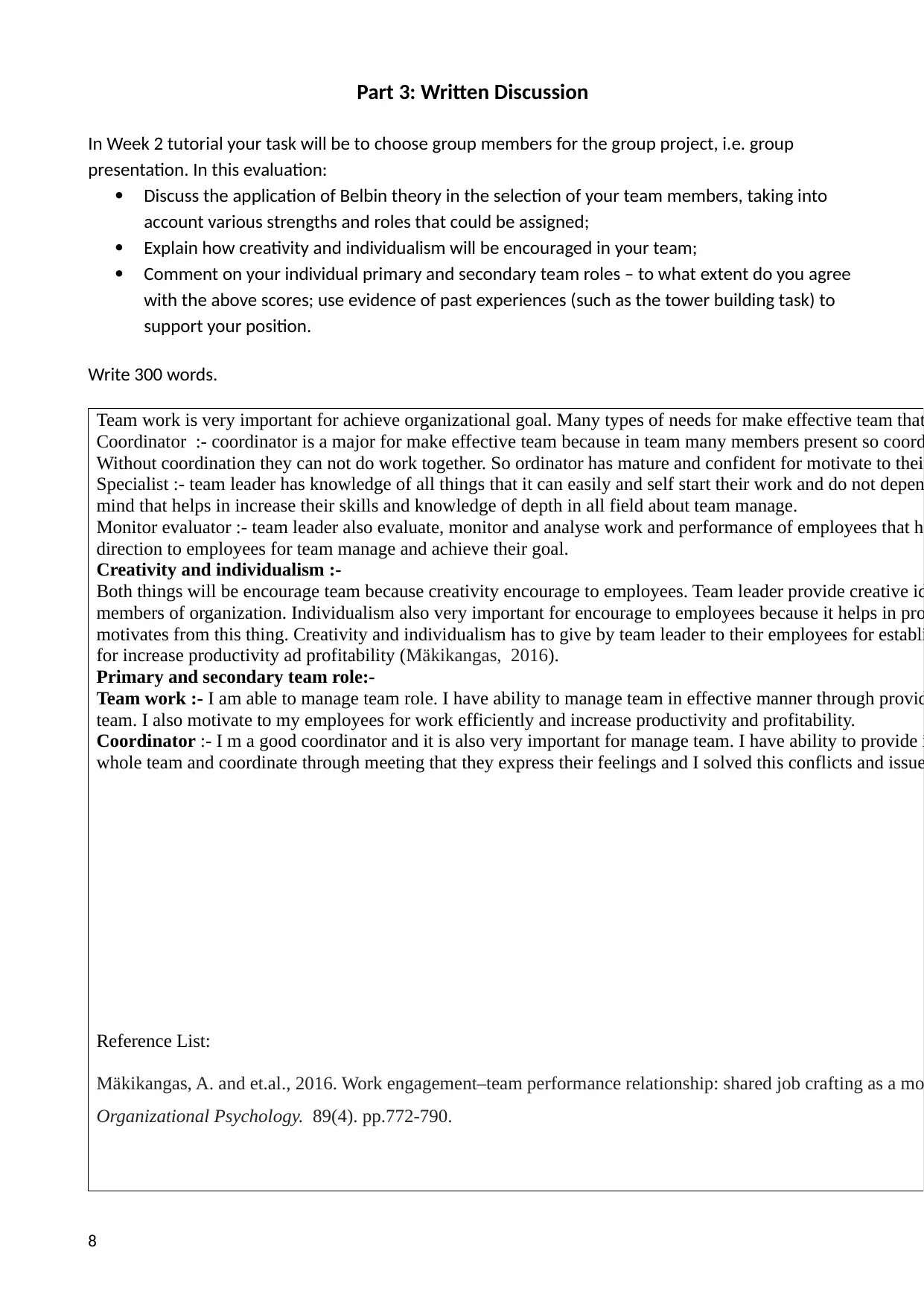
Part 3: Written Discussion
In Week 2 tutorial your task will be to choose group members for the group project, i.e. group
presentation. In this evaluation:
Discuss the application of Belbin theory in the selection of your team members, taking into
account various strengths and roles that could be assigned;
Explain how creativity and individualism will be encouraged in your team;
Comment on your individual primary and secondary team roles – to what extent do you agree
with the above scores; use evidence of past experiences (such as the tower building task) to
support your position.
Write 300 words.
Team work is very important for achieve organizational goal. Many types of needs for make effective team that
Coordinator :- coordinator is a major for make effective team because in team many members present so coord
Without coordination they can not do work together. So ordinator has mature and confident for motivate to thei
Specialist :- team leader has knowledge of all things that it can easily and self start their work and do not depen
mind that helps in increase their skills and knowledge of depth in all field about team manage.
Monitor evaluator :- team leader also evaluate, monitor and analyse work and performance of employees that h
direction to employees for team manage and achieve their goal.
Creativity and individualism :-
Both things will be encourage team because creativity encourage to employees. Team leader provide creative id
members of organization. Individualism also very important for encourage to employees because it helps in pro
motivates from this thing. Creativity and individualism has to give by team leader to their employees for establi
for increase productivity ad profitability (Mäkikangas, 2016).
Primary and secondary team role:-
Team work :- I am able to manage team role. I have ability to manage team in effective manner through provid
team. I also motivate to my employees for work efficiently and increase productivity and profitability.
Coordinator :- I m a good coordinator and it is also very important for manage team. I have ability to provide i
whole team and coordinate through meeting that they express their feelings and I solved this conflicts and issue
Reference List:
Mäkikangas, A. and et.al., 2016. Work engagement–team performance relationship: shared job crafting as a mo
Organizational Psychology. 89(4). pp.772-790.
8
In Week 2 tutorial your task will be to choose group members for the group project, i.e. group
presentation. In this evaluation:
Discuss the application of Belbin theory in the selection of your team members, taking into
account various strengths and roles that could be assigned;
Explain how creativity and individualism will be encouraged in your team;
Comment on your individual primary and secondary team roles – to what extent do you agree
with the above scores; use evidence of past experiences (such as the tower building task) to
support your position.
Write 300 words.
Team work is very important for achieve organizational goal. Many types of needs for make effective team that
Coordinator :- coordinator is a major for make effective team because in team many members present so coord
Without coordination they can not do work together. So ordinator has mature and confident for motivate to thei
Specialist :- team leader has knowledge of all things that it can easily and self start their work and do not depen
mind that helps in increase their skills and knowledge of depth in all field about team manage.
Monitor evaluator :- team leader also evaluate, monitor and analyse work and performance of employees that h
direction to employees for team manage and achieve their goal.
Creativity and individualism :-
Both things will be encourage team because creativity encourage to employees. Team leader provide creative id
members of organization. Individualism also very important for encourage to employees because it helps in pro
motivates from this thing. Creativity and individualism has to give by team leader to their employees for establi
for increase productivity ad profitability (Mäkikangas, 2016).
Primary and secondary team role:-
Team work :- I am able to manage team role. I have ability to manage team in effective manner through provid
team. I also motivate to my employees for work efficiently and increase productivity and profitability.
Coordinator :- I m a good coordinator and it is also very important for manage team. I have ability to provide i
whole team and coordinate through meeting that they express their feelings and I solved this conflicts and issue
Reference List:
Mäkikangas, A. and et.al., 2016. Work engagement–team performance relationship: shared job crafting as a mo
Organizational Psychology. 89(4). pp.772-790.
8

9
⊘ This is a preview!⊘
Do you want full access?
Subscribe today to unlock all pages.

Trusted by 1+ million students worldwide
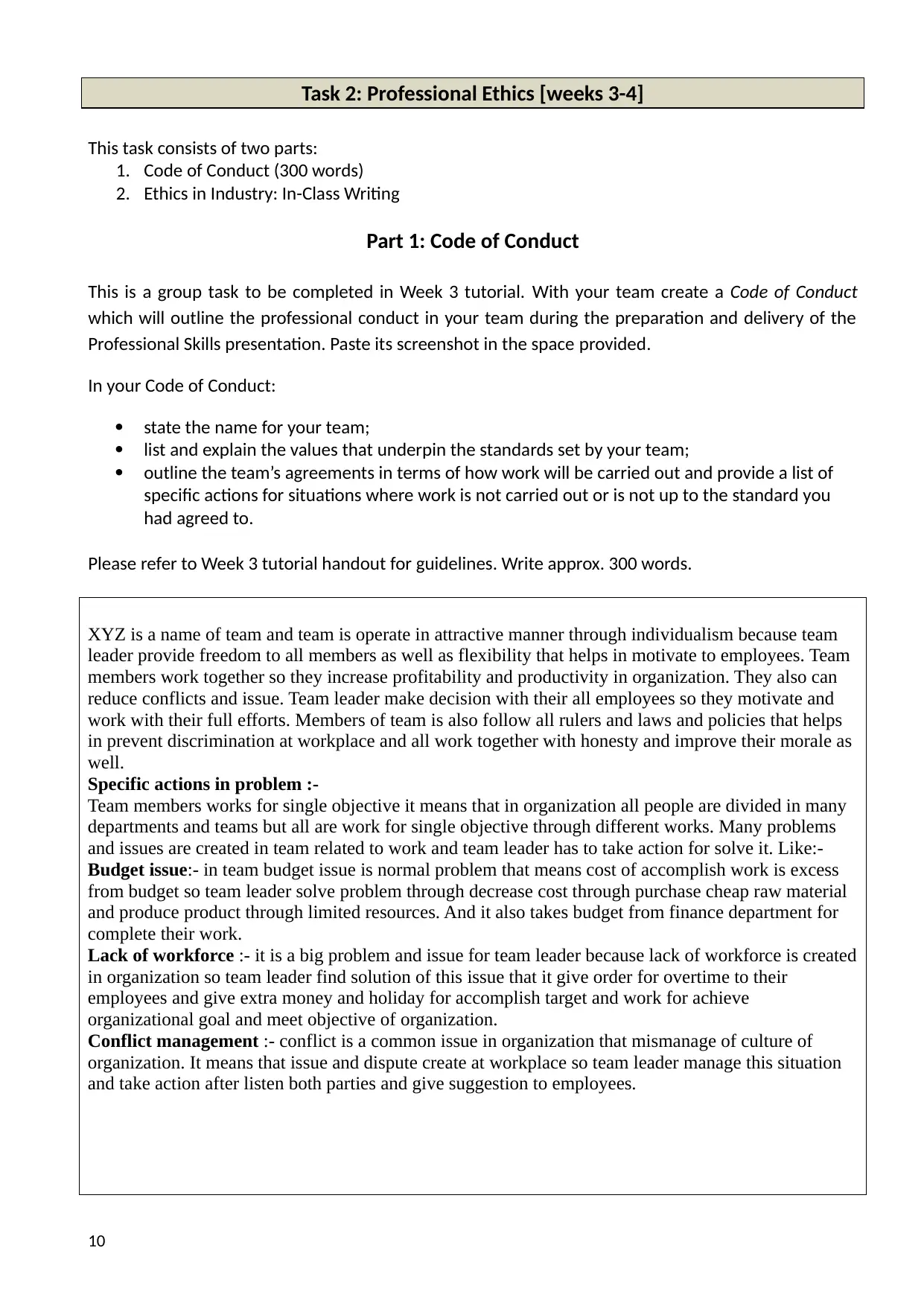
Task 2: Professional Ethics [weeks 3-4]
This task consists of two parts:
1. Code of Conduct (300 words)
2. Ethics in Industry: In-Class Writing
Part 1: Code of Conduct
This is a group task to be completed in Week 3 tutorial. With your team create a Code of Conduct
which will outline the professional conduct in your team during the preparation and delivery of the
Professional Skills presentation. Paste its screenshot in the space provided.
In your Code of Conduct:
state the name for your team;
list and explain the values that underpin the standards set by your team;
outline the team’s agreements in terms of how work will be carried out and provide a list of
specific actions for situations where work is not carried out or is not up to the standard you
had agreed to.
Please refer to Week 3 tutorial handout for guidelines. Write approx. 300 words.
XYZ is a name of team and team is operate in attractive manner through individualism because team
leader provide freedom to all members as well as flexibility that helps in motivate to employees. Team
members work together so they increase profitability and productivity in organization. They also can
reduce conflicts and issue. Team leader make decision with their all employees so they motivate and
work with their full efforts. Members of team is also follow all rulers and laws and policies that helps
in prevent discrimination at workplace and all work together with honesty and improve their morale as
well.
Specific actions in problem :-
Team members works for single objective it means that in organization all people are divided in many
departments and teams but all are work for single objective through different works. Many problems
and issues are created in team related to work and team leader has to take action for solve it. Like:-
Budget issue:- in team budget issue is normal problem that means cost of accomplish work is excess
from budget so team leader solve problem through decrease cost through purchase cheap raw material
and produce product through limited resources. And it also takes budget from finance department for
complete their work.
Lack of workforce :- it is a big problem and issue for team leader because lack of workforce is created
in organization so team leader find solution of this issue that it give order for overtime to their
employees and give extra money and holiday for accomplish target and work for achieve
organizational goal and meet objective of organization.
Conflict management :- conflict is a common issue in organization that mismanage of culture of
organization. It means that issue and dispute create at workplace so team leader manage this situation
and take action after listen both parties and give suggestion to employees.
10
This task consists of two parts:
1. Code of Conduct (300 words)
2. Ethics in Industry: In-Class Writing
Part 1: Code of Conduct
This is a group task to be completed in Week 3 tutorial. With your team create a Code of Conduct
which will outline the professional conduct in your team during the preparation and delivery of the
Professional Skills presentation. Paste its screenshot in the space provided.
In your Code of Conduct:
state the name for your team;
list and explain the values that underpin the standards set by your team;
outline the team’s agreements in terms of how work will be carried out and provide a list of
specific actions for situations where work is not carried out or is not up to the standard you
had agreed to.
Please refer to Week 3 tutorial handout for guidelines. Write approx. 300 words.
XYZ is a name of team and team is operate in attractive manner through individualism because team
leader provide freedom to all members as well as flexibility that helps in motivate to employees. Team
members work together so they increase profitability and productivity in organization. They also can
reduce conflicts and issue. Team leader make decision with their all employees so they motivate and
work with their full efforts. Members of team is also follow all rulers and laws and policies that helps
in prevent discrimination at workplace and all work together with honesty and improve their morale as
well.
Specific actions in problem :-
Team members works for single objective it means that in organization all people are divided in many
departments and teams but all are work for single objective through different works. Many problems
and issues are created in team related to work and team leader has to take action for solve it. Like:-
Budget issue:- in team budget issue is normal problem that means cost of accomplish work is excess
from budget so team leader solve problem through decrease cost through purchase cheap raw material
and produce product through limited resources. And it also takes budget from finance department for
complete their work.
Lack of workforce :- it is a big problem and issue for team leader because lack of workforce is created
in organization so team leader find solution of this issue that it give order for overtime to their
employees and give extra money and holiday for accomplish target and work for achieve
organizational goal and meet objective of organization.
Conflict management :- conflict is a common issue in organization that mismanage of culture of
organization. It means that issue and dispute create at workplace so team leader manage this situation
and take action after listen both parties and give suggestion to employees.
10
Paraphrase This Document
Need a fresh take? Get an instant paraphrase of this document with our AI Paraphraser

11
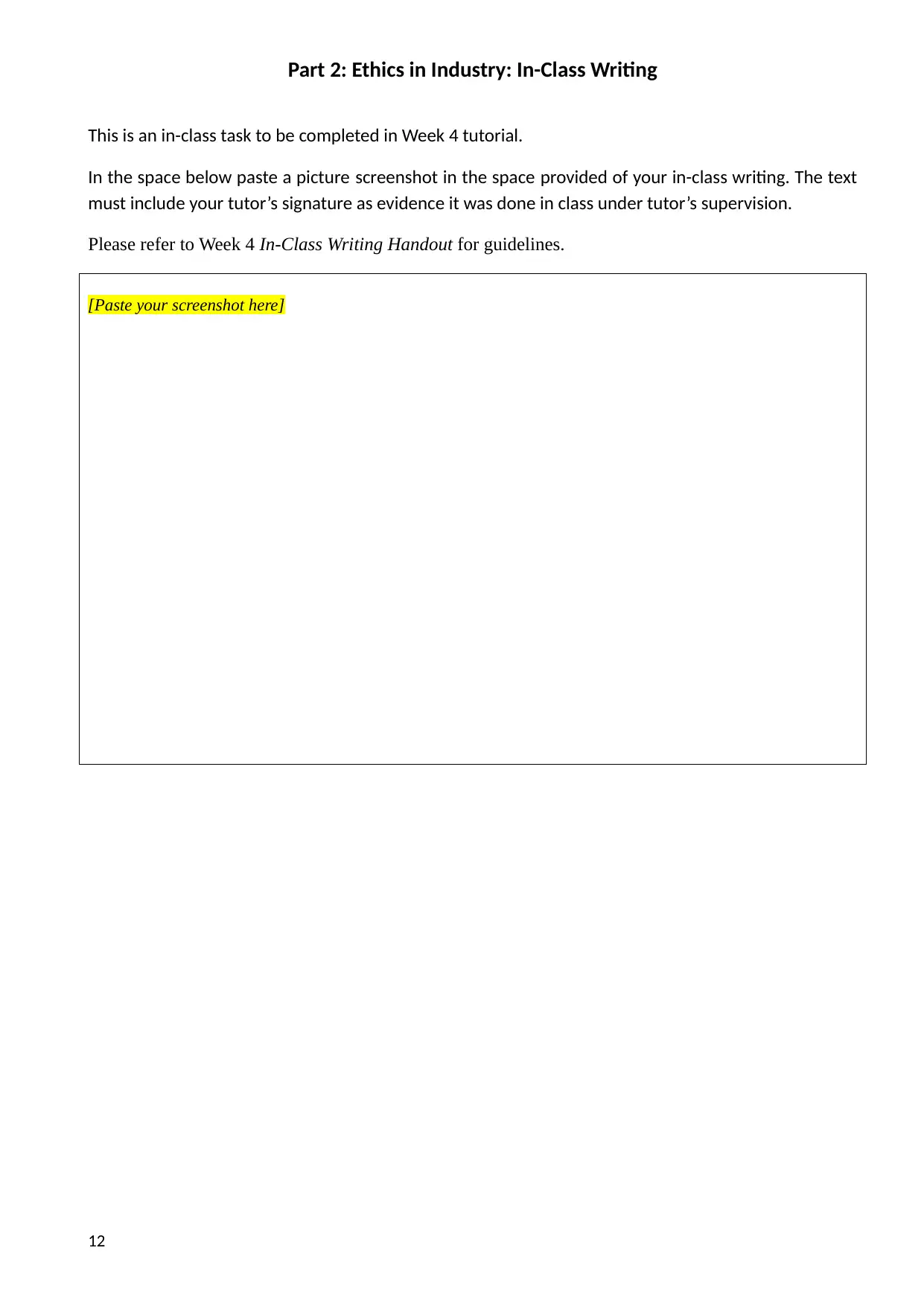
Part 2: Ethics in Industry: In-Class Writing
This is an in-class task to be completed in Week 4 tutorial.
In the space below paste a picture screenshot in the space provided of your in-class writing. The text
must include your tutor’s signature as evidence it was done in class under tutor’s supervision.
Please refer to Week 4 In-Class Writing Handout for guidelines.
[Paste your screenshot here]
12
This is an in-class task to be completed in Week 4 tutorial.
In the space below paste a picture screenshot in the space provided of your in-class writing. The text
must include your tutor’s signature as evidence it was done in class under tutor’s supervision.
Please refer to Week 4 In-Class Writing Handout for guidelines.
[Paste your screenshot here]
12
⊘ This is a preview!⊘
Do you want full access?
Subscribe today to unlock all pages.

Trusted by 1+ million students worldwide
1 out of 20
Related Documents
Your All-in-One AI-Powered Toolkit for Academic Success.
+13062052269
info@desklib.com
Available 24*7 on WhatsApp / Email
![[object Object]](/_next/static/media/star-bottom.7253800d.svg)
Unlock your academic potential
Copyright © 2020–2026 A2Z Services. All Rights Reserved. Developed and managed by ZUCOL.





